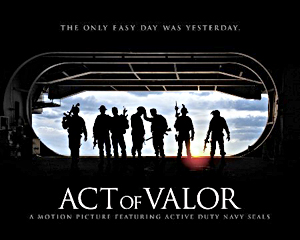As of this post, Act of Valor, the movie about Seal Team 7 tracking down Jihadi-terrorists, has a Rotten Tomato score of 29%. Comparatively, Green Zone, Matt Damon’s non-Jason Bourne “America-is-evil”, war on terror actioner, was 53%. Bourne Identity, 83%.
 Casino Royale, the twenty-somethingth installment of fictional foreign agent tracking down terrorist funders, in at 94%.
Casino Royale, the twenty-somethingth installment of fictional foreign agent tracking down terrorist funders, in at 94%.
So, does that mean Hollywood hates SEAL Team, our military, or even the whole US of A?
No. While Act of Valor has fantastic action sequences (with real bullets!), noble characters and true-to-life, politically-incorrect villains – former Russian scumbags, Jihadi-terrorists and Mexican drug cartels (shocking, just shocking!) — the story is missing something.
It has active protagonists who love their families and serve their country, so check for likeable characters. Though perhaps those scenes are TOO inspirational. No one’s badmouthing US foreign policy, reconsidering the American dream as a lie or blaming Bush.
Ah, check for inspirational voice-overs, poetry and funeral scene (complete with not one but TWO folded flag offerings). These can get you into trouble because they purposefully extort emotions with the audience. However, Terence Malick gets away with this stuff constantly, so we shouldn’t hold it against Act of Valor.
Perhaps the weak acting and cameras out of focus? Yes, but no. Green Zone had both too, and again, Malick’s almost insufferable Thin Red Line has it all and still comes in at 78%.
What’s Missing
What’s missing from Act of Valor is the inner journey. Modern blockbusters – BIG IDEA movies – are about transformation or redemption. Character arc. Sergeant York struggles with pacifism. A Few Good Men worry about measuring up. Rocky needs to go the distance.
But these SEALs are good with family, core, God and country. No one has to rise from screw-up to hero. No sarcastic anti-hero learns to be sacrificial. These guys are Jesus with semi-automatics.
No one even suffers a “testing story”, where a protagonist believes rightly but the external journey forces him through inner doubt and back into certainty.
And there are no true dilemmas. Dilemma is the choice between two equally negative consequences. If a character suffers a dilemma, his decision defines him, and draws the audience into a deeper understanding of his humanity. Spiderman can save the girl or the cable car. The Dark Knight can take its pick, running dilemmas into the absurd (see my analysis).
But all the big character-defining choices are made before Act of Valor starts.
One character makes the decision to stay on the mission instead of going home to see his son born, but that’s not true dilemma. We know he made that choice before the movie started. No one questions him about it. The film spends less than a minute on it, which is wise – NO ONE believes he’s going to abandon his men to go home.
If the whole audience already knows it, it doesn’t count as dilemma. Sorry.
 We also know from the action movie template that he’s a goner. If we meet the man’s pregnant wife, he’s going to die.
We also know from the action movie template that he’s a goner. If we meet the man’s pregnant wife, he’s going to die.
No surprise, no dilemma, no character arc.
This is the shortfall of Act of Valor. These elements keep the critics from getting bored through long action sequences and jargony conversation.
Fixing Act of Valor
1: HOLLYWOOD has to come to grips with the fact that villains exist outside our borders. Not all the critics are justified. It’s not “reactionary politics” to believe that foreign villains want to kill us. Tom Charity at CNN might want to brush up on reality.
The screenwriting theory is that nothing is more terrible as the villain within. That your country or core or you yourself are evil. It’s McKee’s “negation of the negation”: turn the evil within or institutionalize it. After all, if true, what do you do about that?
Perhaps Hollywood got bored with the Cold War or thought the Fog of War extended to all times and all circumstances. Or they increasingly want to please an international market that is perceived to resent America values.
For Hollywood, it’s also lead to the clichés of snotty anti-heroes, moles in the organization, the demonization of Republicans (note the laughable/vomitable portrayals in Shooter and Red), and ultimately the absurd glorification of both anti-Americanism and outright monsters.
Get over it. The dragon isn’t always within. Remember 9/11 (the part where Bush didn’t do it)?
How does Act of Valor field that? Take an extra minute to bash those who glibly call this a propaganda film. That is, write in some liberal media correspondent characters, and make them suffer.
2: Find a person to give a character arc. Act of Valor might have recast Roselyn Sanchez as that liberal media correspondent on a transformation journey toward thankful patriot saved by the SEALs.
Or give one SEAL a mistake that he spends the movie trying to correct. Something that puts stress on the team but also expands their humanity. Even better, make him a new recruit.
Wait – isn’t that another cliché?
Not yet. Certainly not as bad as the “active soldier with pregnant wife” cliché.
But the uninitiated SEAL does one extra thing: it puts THE AUDIENCE on the team. This is the reason why Hollywood puts buddy characters in complex stories: to react and question things as the audience would.
And to be a heart of the audience. Great stories are not simply about glorifying characters we admire but taking an audience through an emotional process of moral decision-making. Best recent example: The King’s Speech, a story of a man who must sacrifice his fears to serve his country.
Had Act of Valor sold that, it might have this generation’s Top Gun.
3: Expand the theme. The SEAL willing to die for his country might realize he’ll have to die for a foreign citizen too, as he struggles with being part of “Team America: World Police.”
Or the wife vows to care for her dead husband’s wounded friend, so we don’t leave a man behind in war or peace.
Or that liberal correspondent might have to sacrifice herself so that the SEALs can get home.
That would be a twist.
What do you think?
